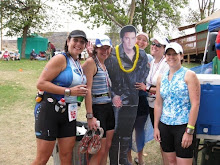Having been sick most of December and now again in January, this was all good advice! - L
By triathlon.org, from usatriathlon.org
Nothing makes an ill triathlete as frustrated as looking out the window and watching his or her training buddies or rivals zooming past on their bikes. A gap in preparation and a blank page in the training diary can be mentally as well as physically damaging, so with this in mind ITU brings you ten tips on how to prevent colds and infection.
Tip 1: Get up to speed
The understanding of the common cold is an important part of prevention. The popular name of the illness is misleading: it's not cold that is actually responsible for infection, but viruses. These pathogens require three conditions to attack someone: firstly they must be present in sufficient numbers, secondly they must find a portal of entry into the body, and thirdly they must establish themselves locally to attack the body's immune system.
Tip 2: Stay away
In order to incur a cold you have to be in contact with the virus or bacterium for it to enter your body. Therefore, when your body's immune system needs to recover after a race or hard training session, or during a time of stress, you should avoid large crowds. Colds are especially transmitted in unventilated areas, such as buses, cinemas, nightclubs, or the endless queue at the supermarket. Stay away from sniveling or coughing people!
Tip 3: Sleep through the night
Sleep is the most important function for the body to recover and recuperate. Whoever sleeps well will reap the benefits later on, especially if they have managed to avoid coffee or other caffeine products before turning out the bedside light. Your bedroom should be well ventilated and not too warm as heated air can dry out the mucous membranes in the nose which defend the body against germs. Most people take six to nine hours of sleep per night, and average sleep requirements decrease with age.
Tip 4: Eat a balanced diet
Many of our food ingredients have a positive effect on the immune system. Vitamins A, E, beta-carotene, C, B6 and folic acid can all help the immune system function. Selenium and zinc also protect and strengthen the immune cells. Taking in food straight after exercise is also important to help the body recover and adequate hydration also affects immune response.
Tip 5: Choose the right clothing
There is a saying that there is no bad weather, only bad clothing. During the winter finding the right things to wear can be difficult. Starting off warm and ending up overheating is a common problem; especially as excess sweat can later cool quickly after exercise and weaken the immune system. Clothing should be chosen so that it keeps the athlete warm for the first ten minutes of training, and then from then on until the end of the session makes them feel pleasantly warm, but not to the point of overheating. A cap or hat keeps in the body heat, and gloves can protect the extremities.
Tip 6: Protect your lungs
The main portal of entry for the pathogens that cause colds are the mucous membranes of the upper respiratory tract. To protect yourself against the microscopic enemy you can take some small measures, such as warming up at the beginning of training, thus increasing the blood flow through the airways. Try breathing in through your nose and out through your mouth. In freezing temperatures you should also protect your airway with a scarf over his mouth and nose to avoid hypothermia. With heavy breathing the frigid air reaches deep into the respiratory tract, so you might choose to move training indoors and onto a treadmill or turbo.
Tip 7: Take a break
The highlights of the coming season are still far away so why risk training and getting an infection if you're feeling run down? Overtraining can worsen symptoms and extend recovery times, and as a worst case scenario it can damage the heart muscle. Treat yourself with care and be considerate of your body's need to rest. If you start to feel congestion, stop training or back off.
Tip 8: Recover correctly
After a training session make sure you get yourself warm and recovered as best as possible. A cool down is essential, but think about changing into dry clothing and extra layers, maybe head inside a gym or into a warm pool rather staying in the cold air. Massage will improve blood supply back to the muscles to help recovery, and go easy on the celebratory beer or wine as alcohol widens the blood vessels and increases heat loss.
Tip 9: Make use of the hot and cold
Doses of hot and cold are useful in stimulating the immune system. Sauna sessions are one of the oldest home remedies to prevent colds, although the exact mechanism is controversial. The temperature change has a positive effect on the immune status but make sure you stay hydrated throughout. If you're feeling tough then taking an ice bath increases resistance to the cold as well as helping muscle recovery. Just make sure you wrap up warm afterwards.
Tip 10: Think positively
It's not just physical stress that impacts on immune function; it's mental ones as well. Negativity, such as anger, sadness and aggressiveness can all affect the body's resistance to illness, so be prepared by looking on the bright side of life. If you're feeling down then make sure you talk to friends and try and put a smile back on your face. Do something fun and exciting if training is getting you down, remember that the 2010 season isn't for months and sometimes it's best to enjoy life away from the bike, goggles and running shoes.
Material courtesy of Frank Wechsel www.tri-mag.de





















2 comments:
what's a turbo mentioned in #6?
I think Turbo Trainer - like for your bike.
Post a Comment